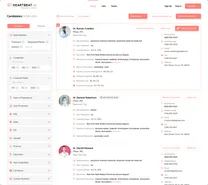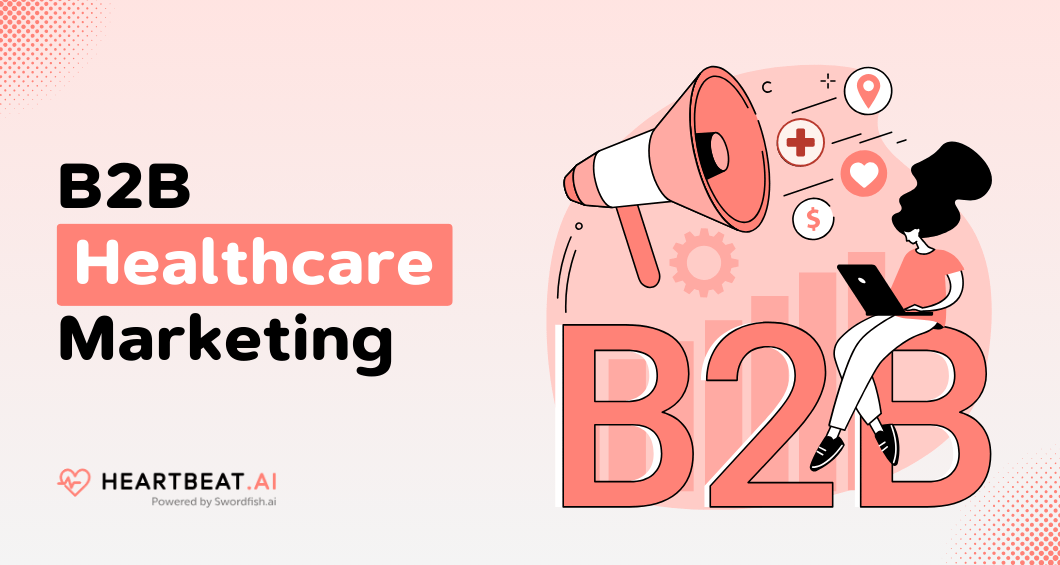
In the USA’s B2B medical marketing, 75% of healthcare professionals believe that digital marketing strategies significantly impact their purchasing decisions.
But what happens when these strategies are overlooked? The absence of a well-defined B2B healthcare marketing plan can lead to missed opportunities, inefficient resource allocation, and ultimately, a decline in market competitiveness.
This guide will navigate you through the essentials of B2B healthcare marketing, offering you a clear understanding of its importance and revealing the key strategies for effective execution. Stay with us till the end to ensure your marketing efforts hit the mark every time.
What’s on this page:
What is B2B Healthcare Marketing?
B2B healthcare marketing refers to the strategies and practices employed by companies that sell medical products or services to other businesses within the healthcare industry.
Marketing in healthcare involves promoting pharmaceuticals, medical devices, and health-related services. It targets healthcare facilities, practitioners, and entities in patient care and medical research.
The goal of B2B marketing is to convince organizations and professionals to buy or subscribe to medical products/services for their operational requirements.
In contrast to consumer marketing, B2B healthcare marketing involves a more complex decision-making process and longer sales cycles. The purchasing decisions are often made by committees that require detailed information, data, and evidence of the product’s efficacy, safety, and cost-effectiveness.
This necessitates a marketing approach that is informative, evidence-based, and highly customized to the specific needs and challenges of the healthcare industry.
Why is B2B Medical Marketing Important?
B2B (Business-to-Business) medical marketing plays an important role in the healthcare industry. It serves as a bridge between medical product manufacturers or service providers and healthcare institutions like hospitals, clinics, and diagnostic centers.
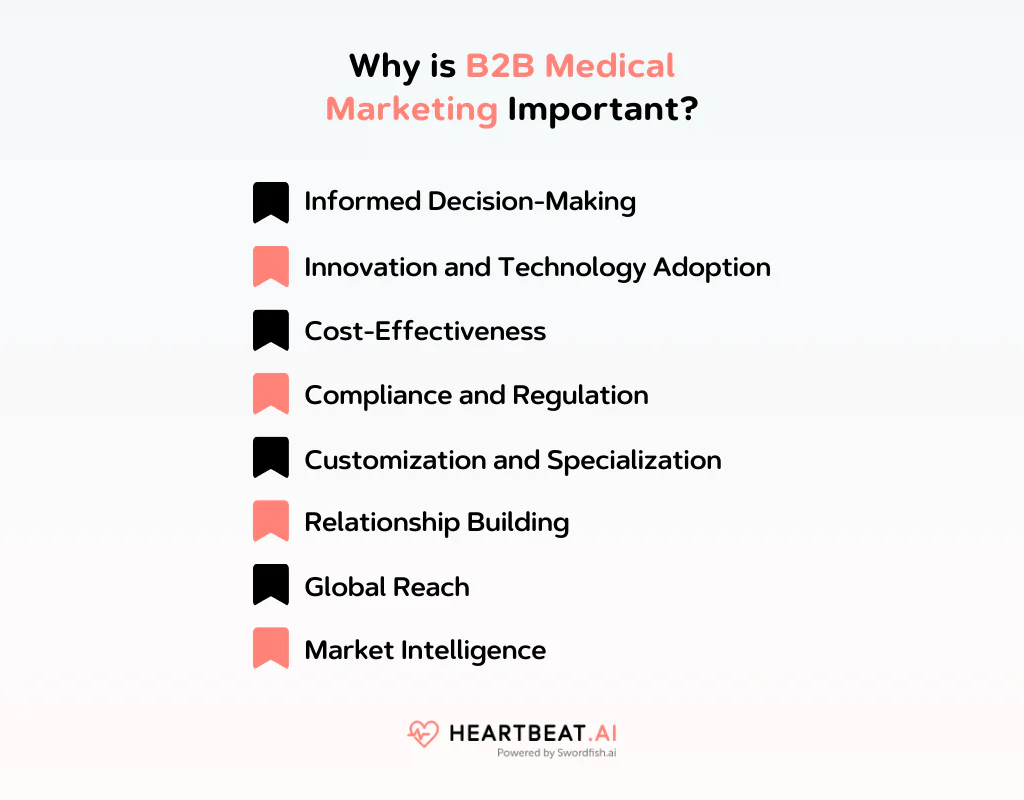
This specialized marketing strategy is essential for several compelling reasons:
Informed Decision-Making
B2B healthcare marketing provides healthcare professionals and decision-makers with the necessary information about the latest medical products, technologies, and services. It empowers them to make choices that enhance patient care and operational efficiency.
Innovation and Technology Adoption
The medical field is rapidly evolving, with continuous advancements in technology and treatment methods. B2B marketing plays an essential role in educating healthcare providers about innovative products and technologies, and facilitating their adoption in clinical practice. This not only improves patient outcomes but also keeps healthcare providers at the forefront of medical innovation.
Cost-Effectiveness
Healthcare organizations are always looking for ways to reduce costs without compromising the quality of care. Through B2B marketing, manufacturers can showcase how their products or services lead to cost savings and improved resource management.
Compliance and Regulation
The medical industry is highly regulated to ensure safety and efficacy. B2B marketing communicates product and service compliance with regulatory standards, assuring healthcare providers of their legitimacy and reliability.
Customization and Specialization
Healthcare needs are diverse and often require specialized solutions. In B2B marketing, companies can highlight their capacity to customize products and services for healthcare institutions. This includes adaptable medical devices, bespoke software solutions, and specialized pharmaceuticals, all designed to meet their specific needs.
Relationship Building
B2B healthcare marketing promotes long-term relationships between manufacturers and healthcare providers. These relationships are built on trust, reliability, and a proven track record of delivering value. Such partnerships are essential for continuous improvement in patient care and operational success.
Global Reach
In an increasingly globalized world, B2B marketing helps medical product manufacturers and service providers reach healthcare institutions worldwide. This not only expands their market presence but also contributes to the global improvement of healthcare standards and access to medical innovations.
Market Intelligence
Engaging in B2B marketing activities allows companies to gather valuable market intelligence. Feedback from healthcare professionals can inform product development, marketing strategies, and service improvements. This ensures that offerings meet the current and future needs of the healthcare sector.
How B2B Marketing is Used in the Medical Sector?
B2B marketing in the medical sector utilizes specific strategies customized for businesses in healthcare, pharmaceuticals, medical device manufacturing, and related fields. Here are key points illustrating how B2B marketing is utilized in the medical sector:
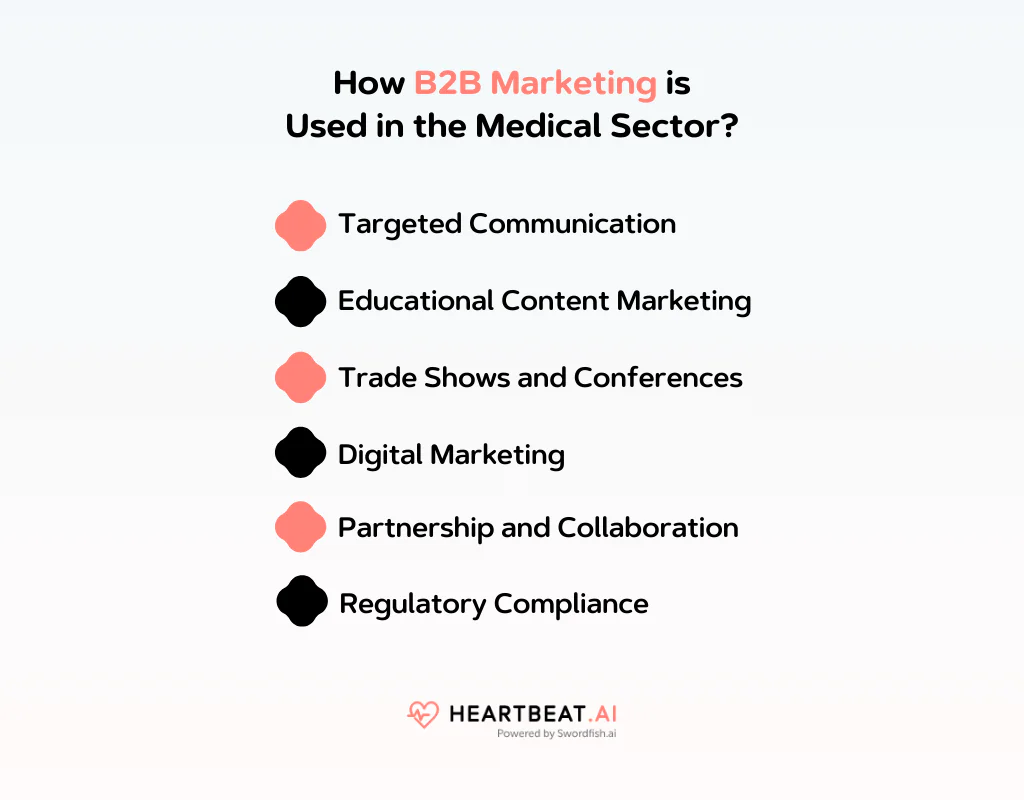
Targeted Communication
Focuses on delivering precise, technical information customized to healthcare professionals, institutions, and companies. This highlights product efficacy, compliance, and scientific backing.
Trade Shows and Conferences
Participating in medical and healthcare trade shows and conferences is vital for demonstrating products, networking with industry professionals, and building relationships with potential clients.
Digital Marketing
To effectively reach healthcare professionals and decision-makers, it is essential to utilize various digital marketing strategies. This includes using SEO, email marketing, social media, and online advertising to establish a strong online presence.
Partnership and Collaboration
Forming partnerships with other businesses in the healthcare ecosystem, such as pharmaceutical companies, research organizations, and healthcare providers, to co-develop or market solutions. This enhances brand credibility and market reach.
Regulatory Compliance
Ensuring all marketing materials and activities comply with healthcare regulations and laws. This emphasizes the importance of accuracy and adherence to maintain trust and credibility within the medical community.
What are the Strategies for Effective B2B Medical Marketing?
To have a successful B2B medical marketing strategy, combine traditional and modern methods to engage healthcare decision-makers effectively. Here’s how you can create a compelling B2B medical marketing strategy:
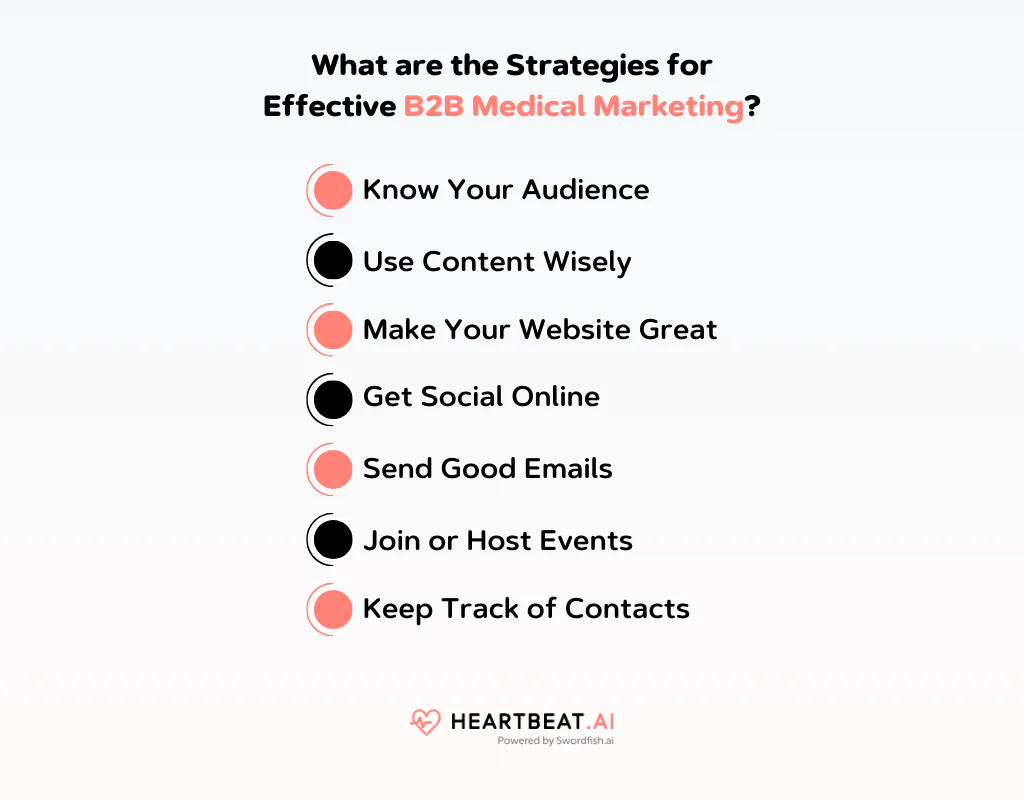
Know Your Audience
Find out who holds the power of decision-making in hospitals and clinics, such as managers and department heads. Communicate with them by showcasing a deep understanding of their challenges and presenting your solutions clearly.
Use Content Wisely
Distribute valuable content like articles, guides, and webinars to demonstrate your expertise in the medical field. This approach not only showcases your knowledge but also promotes trust with your audience.
Make Your Website Great
Ensure your website is attractive, user-friendly, and optimized for search engines. Use keywords and phrases that potential clients might use to find your services, making your site easily discoverable.
Get Social Online
Utilize platforms like LinkedIn to connect with professionals in the healthcare sector. Share your content and consider investing in targeted ads to reach a more specific audience.
Send Good Emails
Craft emails that grab the attention and interest of your target audience. Use this channel to maintain relationships, providing updates and valuable information that serves their needs and interests.
Join or Host Events
Participate in or organize medical conferences and online events to network and showcase your offerings. These opportunities can help you expand your reach and engage directly with potential clients.
Keep Track of Contacts
Implement CRM (Customer Relationship Management) software to efficiently manage your interactions with current and potential clients. This tool aids in understanding their preferences and tailoring your approach to meet their needs effectively.
B2B Healthcare Marketing Trends in 2024
B2B healthcare marketing continues to evolve rapidly, driven by technological advancements, changing market dynamics, and the lasting impacts of the global health crisis. Here are some of the most compelling trends shaping B2B healthcare marketing this year:
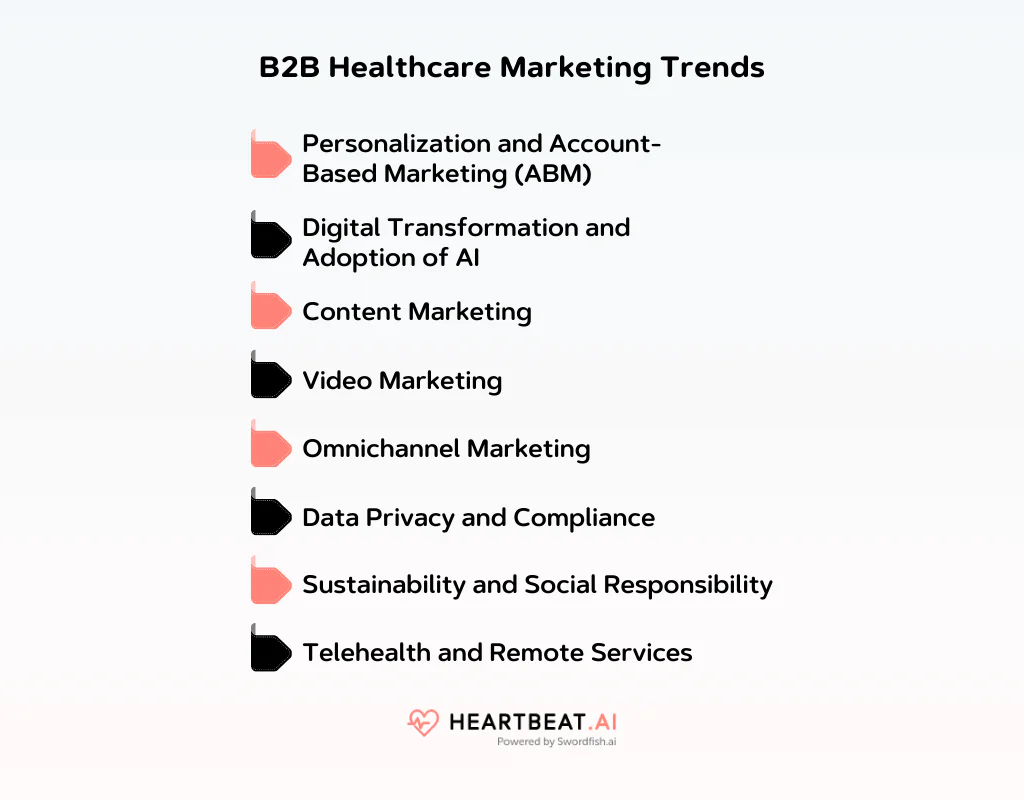
Personalization and Account-Based Marketing (ABM)
ABM focuses on customizing marketing to individual accounts, utilizing data analytics and AI to create customized content and strategies. This addresses the specific needs and challenges of each client.
Digital Transformation and Adoption of AI
The healthcare sector’s digital shift is moved by AI, enhancing marketing with customer behavior analysis, trend prediction, and automation. Chatbots provide personalized, round-the-clock engagement.
Content Marketing
B2B healthcare marketing prioritizes educational, value-driven content like blogs, whitepapers, and webinars to establish thought leadership and support informed decision-making among healthcare professionals.
Video Marketing
Video content’s popularity is rising due to its ability to engage audiences effectively and simplify complex information. This makes it crucial for marketing strategies with diverse formats from explainer videos to testimonials.
Omnichannel Marketing
Emphasizing a unified customer experience across all channels, this approach integrates online and offline efforts for consistent messaging, strengthening brand presence, and enhancing engagement.
Data Privacy and Compliance
With growing concerns over data privacy, healthcare B2B companies are focusing on adhering to regulations like GDPR and HIPAA. This ensures ethical data use and building customer trust.
Sustainability and Social Responsibility
B2B healthcare companies are showcasing their commitment to environmental sustainability and ethical practices. This aligns with consumer expectations for positive societal and environmental contributions.
Telehealth and Remote Services
The continued expansion of telehealth underscores a market shift towards convenience and safety. Marketing efforts are now focused on highlighting how these services improve patient care and support healthcare professionals, making them more engaging and appealing.
B2B Medical Marketing Examples
Let’s explore some compelling examples of B2B healthcare marketing strategies and campaigns that have proven effective in this specialized field.

Educational Content and Thought Leadership
Using educational content, a medical device company emerges as a thought leader. This showcases product efficacy and cost-efficiency through whitepapers, case studies, and webinars.
Example: A medical device manufacturer has developed an extensive library of educational content, such as whitepapers, case studies, and webinars. This content effectively showcases the efficacy and cost-efficiency of their products within clinical settings.
Tactic: By offering valuable insights and data, the company positions itself as a thought leader in its niche. This content is distributed through various channels, such as email newsletters, professional social media platforms like LinkedIn, and industry-specific online forums.
SEO and Content Marketing
By integrating SEO strategies with content marketing, businesses enhance their online visibility, drawing more traffic through engaging articles, blogs, and social media posts. This effectively boosts brand awareness and customer engagement.
Example: A healthcare IT company specializing in electronic health records (EHR) systems launches a targeted SEO and content marketing campaign. The campaign focuses on keywords that hospital administrators and IT professionals are likely to use when searching for EHR solutions.
Tactic: The company publishes blog posts, infographics, and videos that address common concerns and questions about EHR implementation, integration, and security. This strategy not only improves search engine rankings but also builds trust with potential clients by providing them with valuable information.
Trade Shows and Conferences
Participating in trade shows and conferences offers businesses a unique opportunity to network, showcase innovations, and learn industry trends. This directly engages with peers, customers, and thought leaders.
Example: A pharmaceutical company invests in a high-impact presence at major medical trade shows and conferences. They use this opportunity to showcase new drugs, offer live demonstrations, and host expert panels discussing the latest research and developments.
Tactic: Participating in these events allows the company to engage directly with healthcare professionals, distributors, and other key stakeholders. It’s an effective way to generate leads, build brand awareness, and establish industry partnerships.
Social Media and Professional Networking
Example: A medical equipment supplier utilizes professional networking platforms like LinkedIn to connect with hospital procurement officers and healthcare facility managers. They share success stories, customer testimonials, and product updates to engage their target audience.
Tactic: Social media marketing in the B2B medical sector often focuses on building relationships and showcasing expertise. By regularly engaging with their audience in a professional context, the company stays top of mind among potential buyers.
Email Marketing Campaigns
Utilizing social media and professional networking platforms enables businesses to connect with their audience and share expertise. This promotes relationships and builds brand loyalty in a dynamic and interactive online environment.
Example: A biotech firm specializing in diagnostic tools launches a personalized email marketing campaign targeting laboratory managers and biotechnology companies. The emails provide insights into how their tools can streamline diagnostics, improve accuracy, and reduce costs.
Tactic: Personalized email campaigns are highly effective in B2B marketing, as they allow companies to address the specific needs and pain points of their target audience. Through segmentation and personalization, the biotech firm can tailor its message to different segments, increasing the relevance and impact of its communications.
Customer Testimonials and Case Studies
Customer testimonials and case studies powerfully demonstrate a business’s impact, showcasing real-world success stories. They build trust, and credibility, and illustrate the benefits of products or services to prospective customers.
Example: A healthcare analytics company publishes a series of case studies highlighting how their data analysis tools have helped hospitals improve patient outcomes. This tool also reduces operational costs.
Tactic: Customer testimonials and detailed case studies serve as powerful proof points that demonstrate the value of a company’s products or services. By showcasing real-world success stories, the company can effectively build credibility and convince potential clients of the benefits of choosing their solutions.
Get the Contact List of Healthcare for Efficient B2B Healthcare Marketing
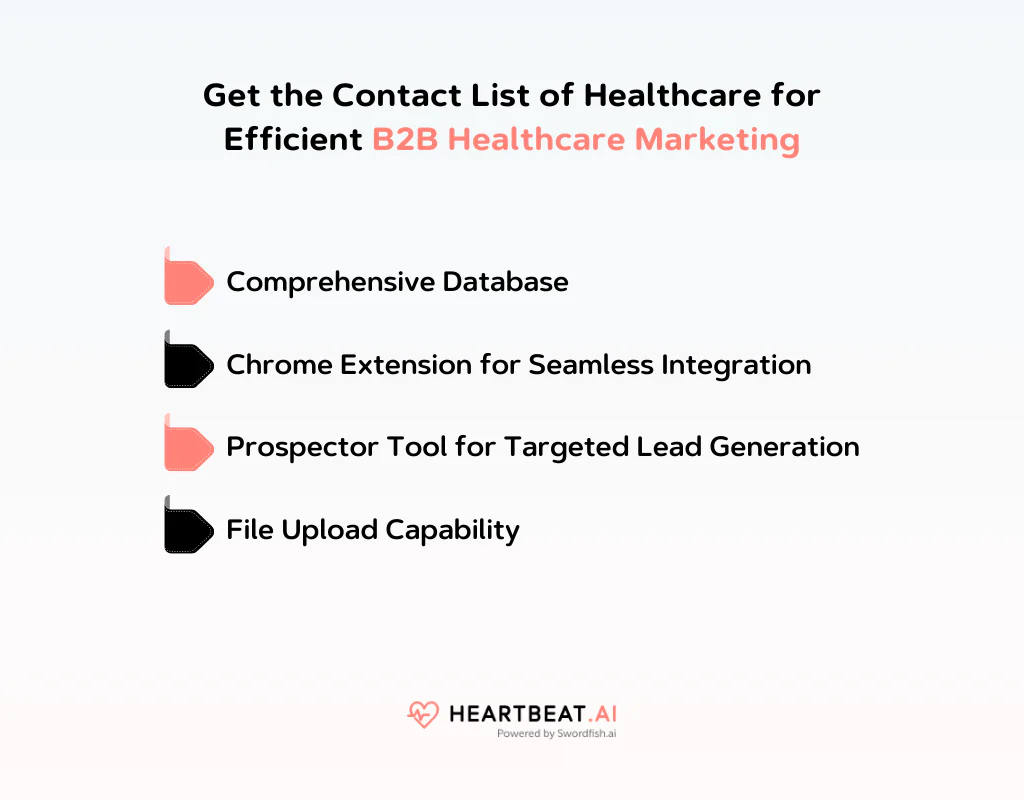
B2B healthcare marketers require the right contact details of healthcare providers and in such cases, Heartbeat AI helps.
Heartbeat AI emerges as a transformative tool, revolutionizing how businesses connect with their target audience in the healthcare sector. Let’s see how Heartbeat helps with B2B medical marketing:
Comprehensive Database
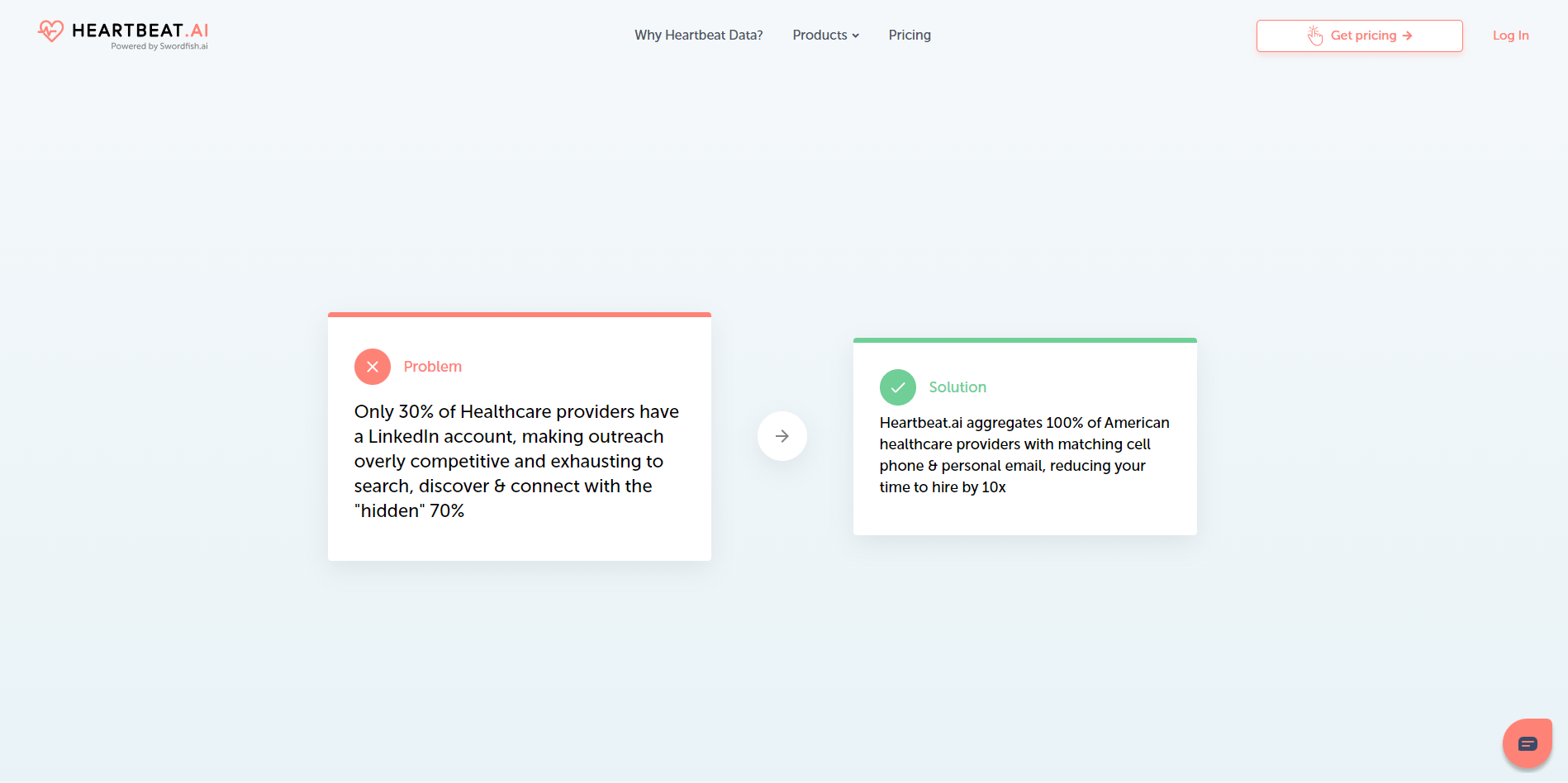
Heartbeat AI’s extensive database serves as a vital resource for B2B medical marketing, offering detailed profiles of healthcare professionals and decision-makers. It enables highly targeted campaigns by providing insights into specialties, affiliations, and contact details.
Chrome Extension for Seamless Integration
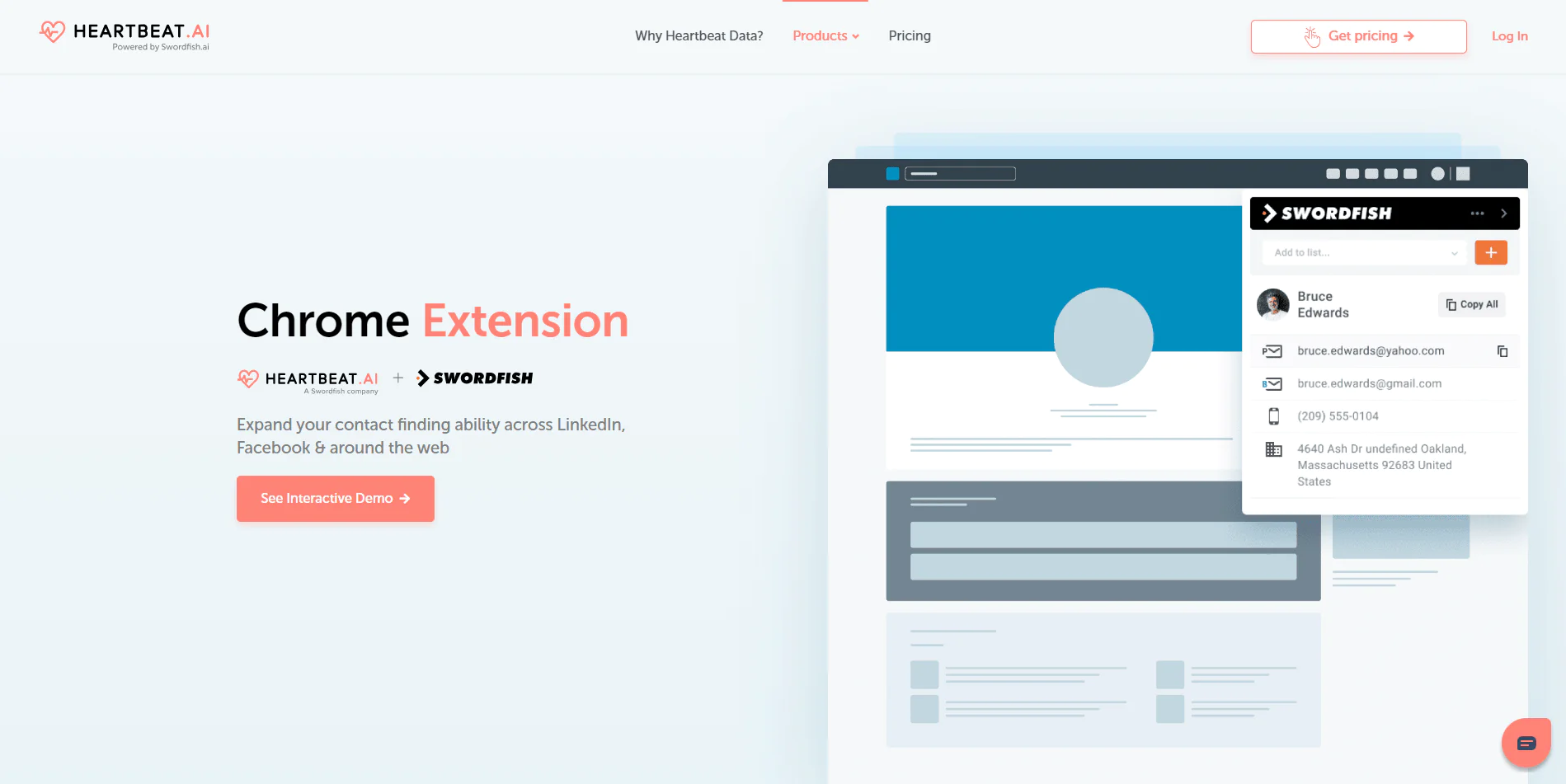
The Heartbeat AI Chrome extension enhances marketing workflows by providing direct browser access to its database. This tool facilitates efficient lead research and connectivity with healthcare professionals, streamlining marketing efforts without platform switching.
Prospector Tool for Targeted Lead Generation
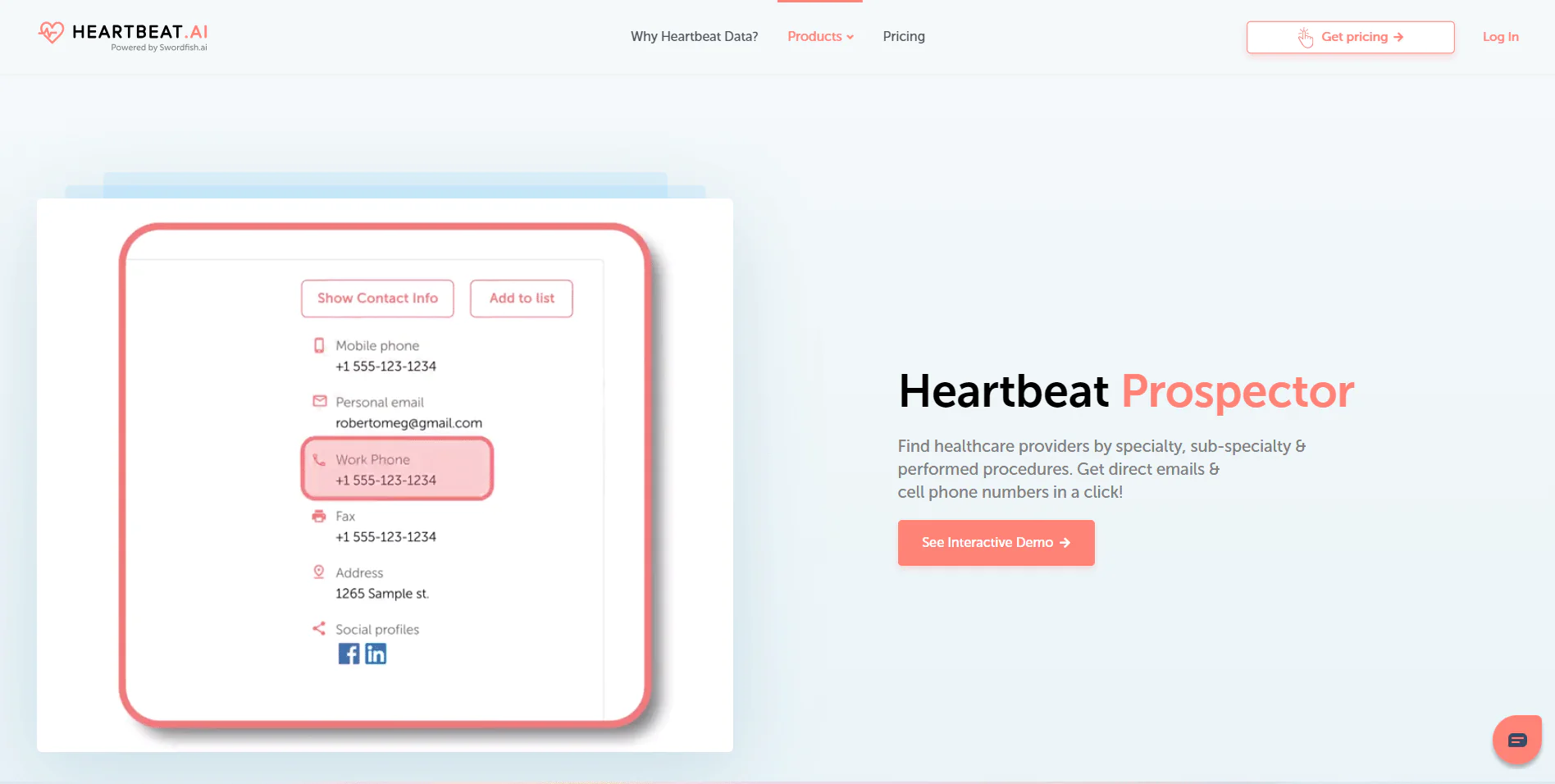
The Prospector tool by Heartbeat AI optimizes lead generation by allowing marketers to set precise criteria for their ideal leads. It efficiently mines the database for matching profiles, boosting the potential for higher conversion rates through targeted outreach.
File Upload Capability
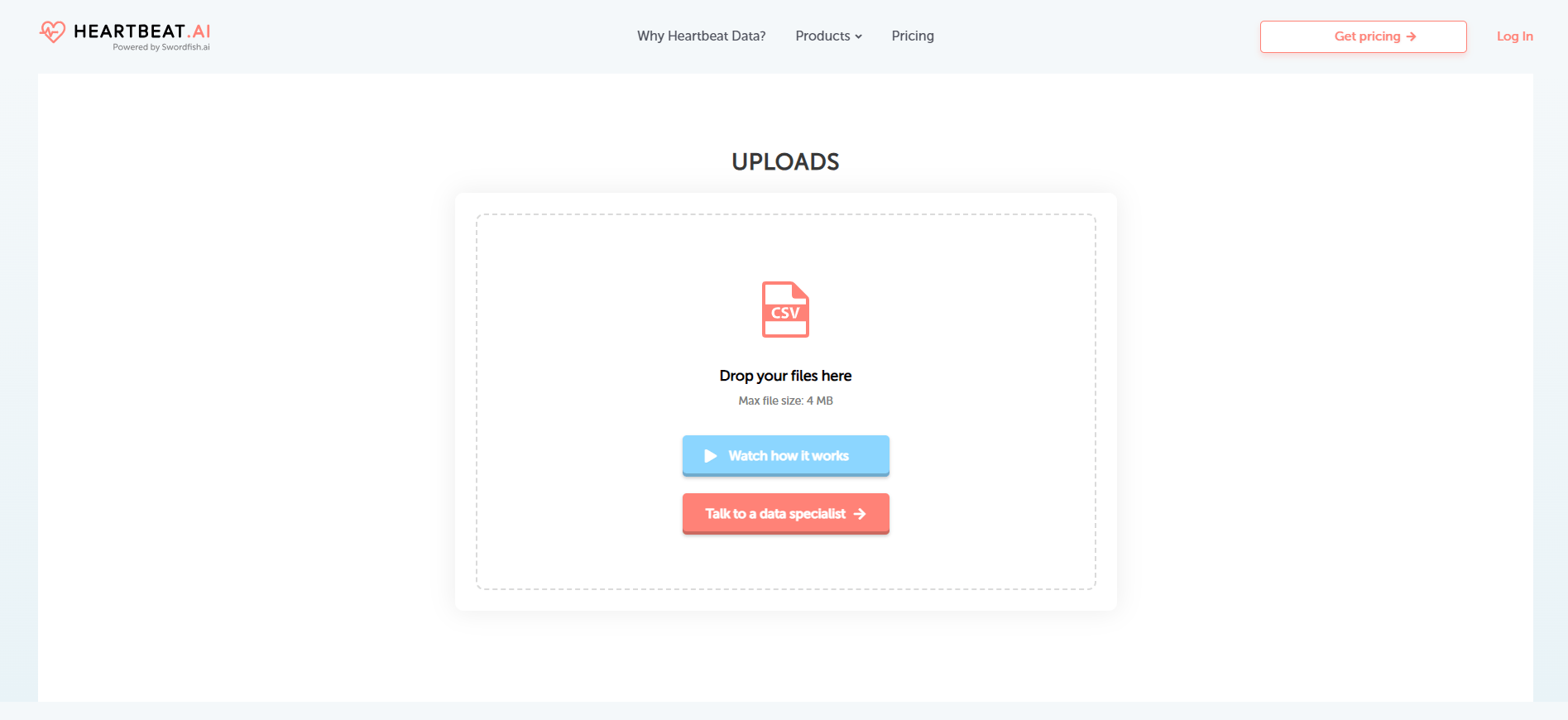
Heartbeat AI’s file upload feature enhances customization by allowing users to enrich their contact lists with data from its database. This improves insights for more customized marketing strategies and optimizing pre-existing databases for better outreach.
Conclusion
Throughout this guide, we’ve looked into the significance of B2B healthcare marketing and uncovered the key strategies for making your mark in the healthcare sector.
These insights are here to help you understand how to do B2B marketing better. They will give you the knowledge to make your marketing efforts in the business world more effective and efficient.
We hope you’ll implement these strategies to elevate your B2B marketing game, promoting stronger connections within the healthcare industry.
Frequently Asked Question
How can I create compelling content for B2B healthcare marketing?
Creating compelling content involves understanding your audience, providing valuable information, and addressing their pain points. High-quality research, case studies, and expert insights can make your content more engaging.
What regulations should I be aware of in B2B healthcare marketing?
B2B healthcare marketing is subject to strict regulations, such as the FDA’s guidelines for promoting medical devices and pharmaceuticals. Familiarize yourself with these regulations to ensure compliance.
What are common B2B marketing channels in the medical field?
Common channels include medical trade shows, conferences, email marketing, social media, content marketing, and partnerships with other healthcare organizations.

